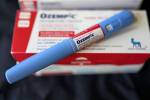Pharmacy students educate teenagers about drug abuse
It all started when Erica Zelickowski heard on the radio that local high schoolers might be abusing prescription drugs more than illegal drugs.
As a pharmacy student at the University of Southern Nevada, Zelickowski realized that she and her classmates were in a prime position to do something about it.
She didn't have to convince them or her teachers. She and four other students -- Susan Armino, Immanuel Ijo, Krystal Riccio and Mikiko Yamada -- quickly formed the Drug Abuse Awareness Team, or DAAT.
The group, which has grown to 60 members since it started about a year ago, so far has educated eighth-graders at two middle schools on the dangers of taking prescription drugs inappropriately. DAAT was nominated for the 2007 Profiles in Courage.
Zelickowski, who is 29, said prescription drugs can seem more socially acceptable than illegal drugs and may provide a false sense of safety. They also are widely available from varied sources -- drug dealers, online pharmacies and parents' medicine cabinets.
"One thing we emphasize through the presentation is that these drugs can be extremely useful and can be used right in the right situation: if they are approved under the care of a physician so that a physician can monitor if they are reacting well to the drugs," she says.
DAAT's 45-minute PowerPoint presentation packs a wealth of information. While it focuses primarily on legal drugs, including those bought over the counter, it also covers illegal drugs, alcohol and the symptoms and risks of addiction.
The team targets eighth-graders so that by the time they reach high school, Zelickowski says, they can better handle peer pressure to indulge in "pill parties" and other forms of non-medical use that can prove dangerous, if not deadly.
"We give a lot of background so that they can understand you could be misusing or abusing a drug, and not even realize it," Zelickowski says.
Teenagers are increasingly turning away from street drugs and using prescription drugs to get high, according to a 2007 report by the Office of National Drug Control Policy. Among 12- to 17-year-olds, new abusers of prescription drugs, including pain relievers, tranquilizers, stimulants and sedatives, are catching up to new marijuana users.
The report, "Teens and Prescription Drugs," says pain relievers such as OxyContin and Vicodin are the most common prescription drugs abused by this age group.
Late last year, DAAT took its presentation to health classes at Woodbury and Duane D. Keller middle schools.
It was in Rosemary DeVito's class that they made the presentation at Keller.
DeVito says the information was well-organized but a little over the students' heads -- it preceded the substance abuse portion of their curriculum. It seemed to sink in more after they studied that material, she says.
Sharing DeVito's views is Shannon LaNeve, a K-12 health project facilitator at Clark County School District. LaNeve has not seen the presentation in class but had previewed it.
While the DAAT information is more in-depth, she says, it also may resonate more with students.
"Instead of just hearing it from the teacher, they are hearing it from someone studying to be in the field of pharmaceuticals," LaNeve says.
The DAAT message reinforces an effort that begins in Clark County elementary schools, says Sgt. Mark Sharp of the Las Vegas Metropolitan Police Department. Sharp is the state administrator of Drug Abuse Resistance Education, or DARE.
The DARE program consists of classroom sessions in which police officers teach students to resist peer pressure, drugs and violence.
"For any drug prevention program to be effective, it has to be reinforced," Sharp says.
DAAT plans to visit more middle schools this year. And there is some interest in expanding the organization to the university's satellite campus in Utah, says Armino, a founding member.
It's hard to quantify how many, if any, teenagers the group has discouraged from abusing drugs.
"We do want to analyze our success," says Paul Oesterman, USN assistant professor of pharmacy practice and DAAT faculty co-advisor.
Due to privacy issues, he says, the group cannot survey the students. But DAAT contact information is left at schools after the presentations, and students have called anonymously with questions.
"They have done an awesome job. I'm so proud of them," Oesterman said of the team.
"They are not only dispensers of prescriptions but dispensers of information."
Contact reporter Margaret Ann Miille at mmiille@reviewjournal.com or (702) 383-0401.
Editor's Note: Seeking heroes in our own time, the Review-Journal annually asks the public to nominate people who in the past year took serious risks to life, career, financial well-being or other personal interests for the greater good of humanity. This is the last of six "Nevada Profiles in Courage" about some who performed such deeds in 2007.




























